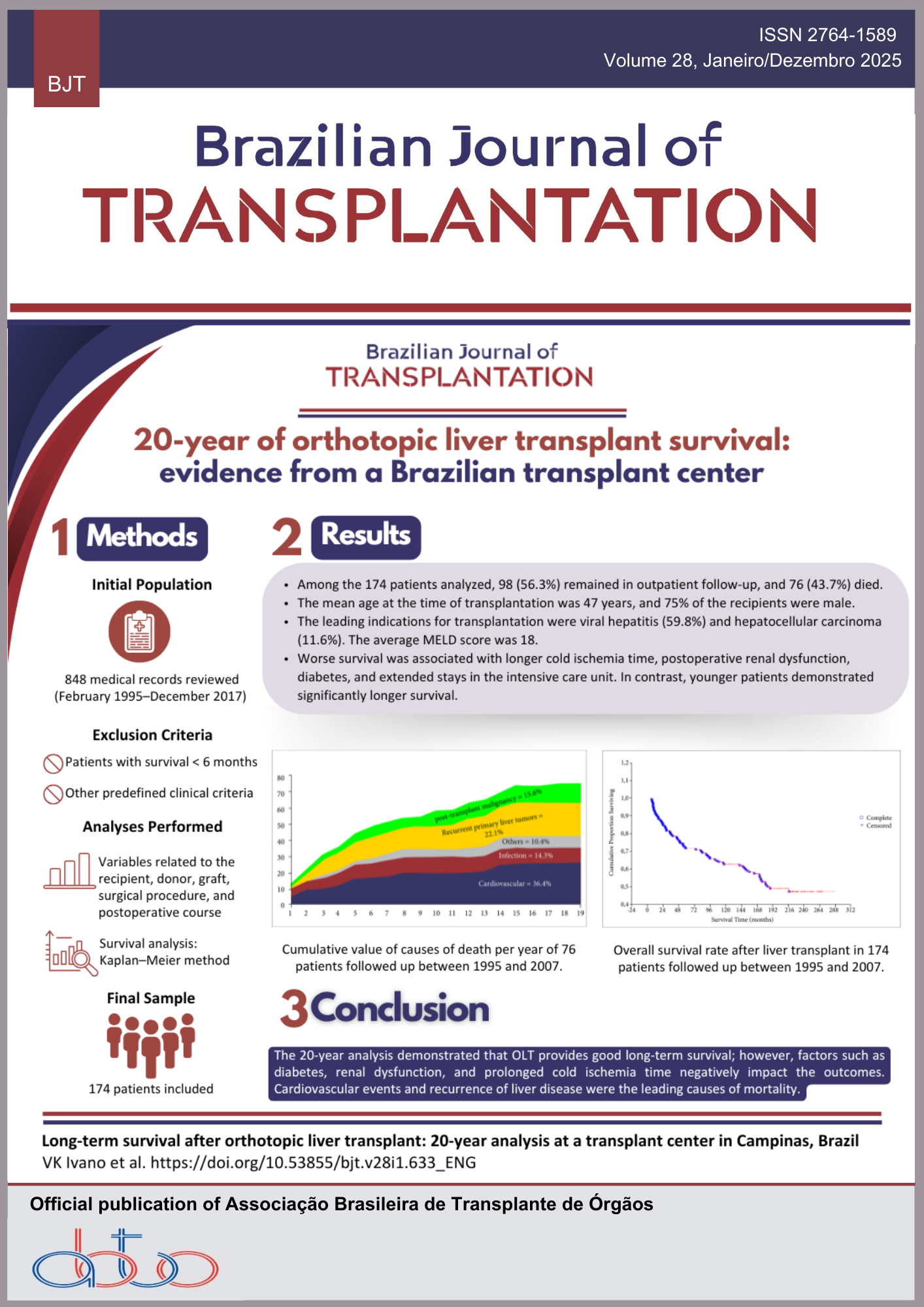Survival and Access to Kidney Transplantation of High-Urgent Patients Due to Vascular Access Failure
Keywords:
Kidney Transplantation, Dialysis, Survival Analysis, Vascular Access Devices, Immunologic SensitizationAbstract
Introduction: Total and permanent lack of access to dialysis was considered a high-urgency (HU) candidate for transplant, as established by the Brazilian kidney allocation system. This procedure allows them to receive the first ABO-compatible and negative T and B-cell CDC-CM kidney. We aimed to compare the survival on the WL and the access to transplant between HU patients and non-HU candidates. Methods: This observational, retrospective study included 22,545 adult kidney transplant candidates listed in the state of São Paulo, from January 2010 to December 2018, and analyzed until December 2019; follow-up time was 27 months. Seven hundred and eighty-eight (3.5%) patients were considered HU. Results: Most of the WL were male (59%), mean age of 51 years (± 20), and non-sensitized (70%); 1,301 (5.8%) were previously transplanted. Compared to the non-HU, the HU group was younger, mostly female, more previously transplanted, and more sensitized: panel reactive antibody (PRA) 11-85% (24% vs. 17%; p < 0.001) and PRA > 85% (14% vs. 7.8%; p < 0.001). Diabetes (odds ratio [OR] 1.988; p = 0.000) and PRA > 85% (OR 1.9; p = 0.000) were risk factors for death, mainly in HU patients (diabetes: OR 2.39; p = 0.045/PRA > 85%: OR 15.06; p = 0.000). Age was a risk factor for death in non-HU, with worse outcomes in the 51-60 years group (OR 2.72; p = 0.000) and the > 60 years group (OR 4.3; p = 0.000). Patients with chronic glomerulonephritis were transplanted more frequently in both groups (OR 3.8 vs. 1.8; p = 0.000). The HU group received more transplants (88% vs. 40%, p = 0.000), had lower mortality (7% vs. 19%; p = 0.000), and spent less time on the list (5% vs. 41%; p = 0.000). Sensitized were more difficult to transplant, even in the HU group (PRA 51-85%: OR NP 0.54 vs. P 0.43; p = 0.008/PRA > 85%: OR NP 0.19 vs. P 0.06; p = 0.000). Conclusion: Elderly, diabetic, and sensitized patients had worse results on the list. Giving urgency to patients with dialysis access failure allowed better survival, greater and faster access to transplantation, except if PRA > 50%.
Downloads
References
1. Lew SQ, Kaveh K. Dialysis access related infections. ASAIO J 2000 [access on May 4, 2023];46:S6-12. Disponível em: https:// journals.lww.com/asaiojournal/abstract/2000/11000/dialysis_access_related_infections.30.aspx
2. Nassar GM, Ayus JC. Infectious complications of the hemodialysis access. Kidney Int, 2001;60:1-13. https://doi.org/10.1046/j.1523-1755.2001.00765.x
3. Assfalg V, Huser N, van Meel M, Haller B, Rahmel A, de Boer J, et al. High-urgency kidney transplantation in the Eurotransplant Kidney Allocation System: success or waste of organs? The Eurotransplant 15-year all-centre survey. Nephrol Dial Transplant, 2016;31(9). https://doi.org/10.1093/ndt/gfv446
4. Celebi ZK, Akturl S, Erdogmus S, Kemaloglu B, Toz H, Polat KY. Urgency priority in kidney transplantation: experience in Turkey. Transplant Proc, 2015;47(5). http://doi.org/10.1016/j.transproceed.2015.04.034
5. Gameiro J, Jorge S, Neves M, Guerra J. High-urgency renal transplantation for patients with vascular access failure: a singlecenter experience. Transplant Proc, 2019;51(5). https://doi.org/10.1016/j.transproceed.2019.01.043
6. Neves PDMM, Sesso RCC, Thomé FS, Lugon JR, Nascimento MM. Brazilian Dialysis Census: analysis of data from the 2009-2018 decade. Braz J Nephrol, 2020;42(2). https://doi.org/10.1590/2175-8239-JBN-2019-0234
7. Costa MG, Garcia VD, Leirias MM, Lugon JR, Nascimento MM. Urgency priority in kidney transplantation in Rio Grande do Sul. Transplant Proc, 2007;39(2). https://doi.org/10.1016/j.transproceed.2006.12.035
8. Valentin MO, Ruiz JC, Vega R, Martín C, Matesanz R. Implementation of a national priority allocation system for hypersensitized patients in Spain, based on virtual crossmatch: initial results. Transplant Proc, 2016;48(9). http://doi.org/10.1016/j.transproceed.2016.09.024
9. Castro MCR, Malafronte P, Silva EF, Cunha MFM, Siqueira R, Baptista-Silva JCC, et al. Desensitization for ABO incompatible kidney transplantation: experience of a single center in Brazil. Transplant Rep, 2017;2(4):22-24. http://doi.org/10.1016/j.tpr.2018.02.001
10. Berchtold C, Huebel K, Roessler F, Graf N, Dutkowski P, Lehmann K, et al. The burden of ABO incompatible kidney transplantation: readmission rates and complications, a twenty-year analysis. J Clin Med, 2024;13(23). https://doi.org/10.3390/jcm13237477
11. Melshari KA, Pall A, Chaballout A, Gamal HE, Mana HA, Humaidan H, et al. Outcome of desensitization in human leukocyte antigen – and ABO-incompatible living donor kidney transplantation: a single-center experience in more than 100 patients. Transplant Proc, 2013;45(4). https://doi.org/10.1016/j.transproceed.2013.01.081
12. Machado DJB, Nahas WC, David-Neto E. Pioneering experience of first kidney paired donation in Brazil. Braz J Nephrol, 2022;44(3). https://doi.org/10.1590/2175-8239-JBN-2021-0259
13. Kute VB, Shah PS, Vanikar AV, Gumber MR, Patel HV, Engineer DP, et al. Increasing access to renal transplantation in India through our single-center kidney paired donation program: a model for the developing world to prevent commercial transplantation. Transplant Int, 2014;27(10). https://doi.org/10.1111/tri.12373
14. Sandes-Freitas TV, Abbud-Filho M, Garcia VD. Reasons for disparities in access to kidney transplantation. Contrib Nephrol, 2021;199. https://doi.org/10.1159/000517713
15. Patrick G, Hickner B, Goli K, Ferreira LC, Goss J, Rana A. Trends in survival on adult organ transplantation. Ann Surg Open, 2024;5(1). https://doi.org/10.1097/AS9.0000000000000383
16. Sá IJAS, Castro MCR. Impacto dos problemas cumulativos do acesso vascular para diálise nos desfechos de tx renal doador falecido. Anais do XVII Congresso Brasileiro de Transplantes; 2023; Brasília, DF. São Paulo: ABTO; 2023 [access on Mar 7, 2025] Disponível em: https://bjt.emnuvens.com.br/revista/article/view/463/448
Downloads
Published
How to Cite
Issue
Section
License
Copyright (c) 2025 Claudia Coimbra César de Albuquerque, Daniel do Nascimento Gazolla, Fabiana Agena, Elias David-Neto, Francisco de Assis Monteiro, Maria Cristina Ribeiro de Castro

This work is licensed under a Creative Commons Attribution 4.0 International License.









